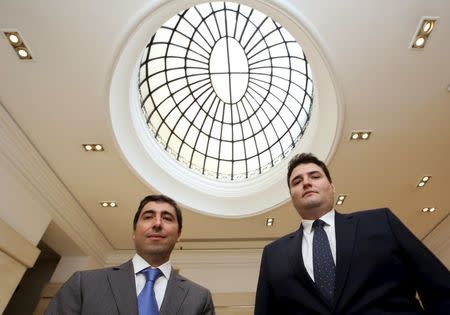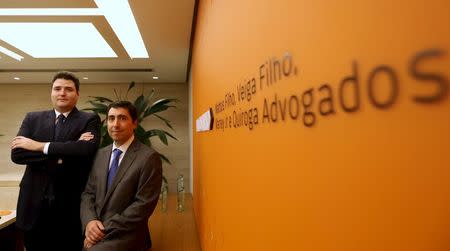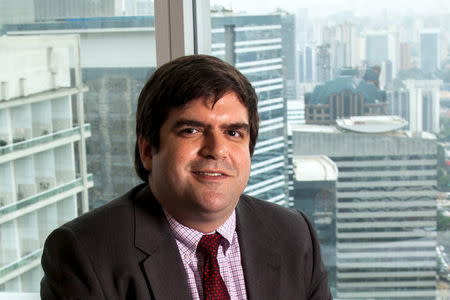Brazil graft crackdown spurs work for lawyers, corporate change
By Caroline Stauffer
SAO PAULO (Reuters) - In the midst of Brazil's worst recession in decades, lawyer Thiago Jabor Pinheiro switched firms to focus full-time on one of the only booming fields in the scandal-plagued country: compliance and corporate ethics.
For Pinheiro, a massive corruption investigation unfolding at state-run oil firm Petrobras offers a golden opportunity. The scandal broke just as a tough new anti-corruption law went into effect in Brazil, raising the risk of prosecution for scores of companies.
The sweeping Petrobras investigation and the 2013 law, known as the Clean Companies Act, have sparked a frenzy of legal activity similar to what happened in the United States over a decade ago when the Foreign Corrupt Practices Act (FCPA) was implemented.
Brazilian magistrates have jailed some of Brazil's best-known executives, including Marcelo Odebrecht, the scion of a billionaire family controlling Latin America's largest engineering firm, and are increasingly turning their attention to companies themselves.
New raids are occurring on a near weekly basis, including recently one probing alleged tax fraud at steelmaker Gerdau SA.
"We believe the number of judicial and administrative cases is going to increase," Pinheiro, 33, said at the spacious Sao Paulo offices of Brazilian law firm Mattos Filho, where he started in December.
"We want to be part of this movement."
Mattos Filho has expanded its compliance department – tasked with ensuring corporate clients strictly follow Brazilian legislation - from three lawyers to 17 people in three years.
The legislation has jolted Brazil's corporate culture by making it easier for companies, instead of just individuals, to be held responsible for graft. Some say Brazil's law is in some ways even tougher than the U.S. legislation that inspired it.
"This law did a lot more than just create rules. It brought new legal concepts, and even changed the opinion of society," said Fernando Villela de Andrade Vianna, a partner at Siqueira Castro, another one of Brazil's largest law firms. Since 2013, it has doubled the size of its compliance unit, which now has 15 lawyers.
A 2015 survey by consulting firm Deloitte said more than 60 percent of Brazilian companies had internal legal compliance departments, double the number in 2013.
Ronaldo Fragoso, head of corporate risk management for Deloitte in Brazil, said the number is even higher today.
Odebrecht SA, which had previously denied participating in the Petrobras scheme, pledged on Tuesday to overhaul its transparency and anti-corruption requirements in line with international standards. It also said its executives would seek plea deals and collaborate with prosecutors to help "build a better Brazil."
Brazil has few trained compliance professionals so demand for international specialists is strong, particularly as the Petrobras investigation turns up violations of the FCPA by U.S. companies that did business in Brazil or Brazilian companies whose stocks or bonds are registered to trade in the United States.
U.S. law firms such as Gibson, Dunn & Crutcher, which is conducting an FCPA review of Petrobras, and Hogan Lovells, in charge of the internal review at state-run electric utility Eletrobras, are partnering with Brazilian law firms to review possible violations of laws in both countries.
Consulting firms and auditors like Kroll, which was hired by Eletrobras, and KPMG, contracted by meatpacker JBS SA, are also benefiting.
"A lot of people I know in the market are heading down to Sao Paulo and Rio," said Richard Smith, head of Regulatory and Governmental Investigations at Norton Rose Fulbright in Washington.
Smith, like many U.S. compliance specialists working in Brazil, remains based in the United States and travels back and forth.
COMPANIES ADJUST
The change is visible at Petrobras, or Petroleo Brasileiro SA as it is formally known.
The company wrote off $2.1 billion in losses to corruption and also faces a class action lawsuit brought by investors in the United States.
Previously, Renato Duque, one of the first people jailed in the corruption scandal, oversaw compliance along with engineering and services. Now a senior compliance officer is one of the company's top six executives and a former member of Brazil's attorney general's office sits on its board.
Prior to the investigation, the board barely read financial statements before approving them but last quarter they got the documents in advance and worked from 8 a.m. to 8 p.m. without a lunch break before voting, according to a source with knowledge of the meeting.
Marcel Fonseca, who is implementing a global compliance program at JBS, another of Brazil's corporate giants, says business relations in notoriously informal Brazil are becoming "more structured" as a result of the scandal and the new law.
Transforming itself from a small-town butcher to the world's largest meat producer in three decades, family-run JBS was a flagship of Brazil's economic miracle. But the federal audit court is now investigating loans from state-run development bank BNDES that helped JBS finance a spree of acquisitions.
The company's chairman was charged with crimes against the financial system in Sao Paulo in January. JBS denies wrongdoing.
Fonseca, who previously worked for GE Healthcare, is adjusting JBS guidelines for interacting with government officials, including setting up meetings, bidding in state auctions, and giving or receiving gifts.
"The greatest challenge is making people aware of why the compliance program is relevant to the company and to them," he said. "It's a change of behavior."
'YOU HAVE IT OR YOU ARE OUT'
Companies that fail to establish compliance programs will pay dearly, said Carlos Ayres, a partner at Trench, Rossi e Watanabe, the firm conducting an internal review of Petrobras in Brazil.
Such companies may not get loans, could be locked out of merger and acquisition opportunities, and will likely be shunned by private equity firms and venture capitalists, he said.
"Either you have it or you are out," said Ayres, who teaches a course on compliance at the Fundação Getulio Vargas law school in São Paulo. One of the only courses specifically focused on compliance in Brazil, it was full months before it started.
Beyond adopting compliance programs, companies will have to adopt a "tougher posture" with government officials - not only refusing to pay bribes but reporting corrupt officials and taking legal action against them, said Renato Portella, another partner at Mattos Filho.
"Some companies prefer to resolve things smoothly, but given the enormous risks of punishment today... I think they will have to adopt a posture of confrontation," he said.
While most observers say more accountability and less corruption will ultimately benefit Brazil, economists have said the cost has been high as the woes of Petrobras and dozens of engineering firms contributed to Brazil's worst recession in decades.
Uncertainty remains over the future of these firms as details need to be worked out on leniency deals that would allow them to settle their cases and pay fines to regain the right to bid for government contracts.
Fragoso, of Deloitte, said it usually takes companies two or three years to see results from a compliance program. In the long-term, he said, the trend is certainly positive for Brazil.
Andrew Haynes, the co-head at Norton Rose Fulbright's Brazil unit, said the shift in corporate culture was irreversible. "Now companies have to show they are managing corruption risks in a robust way or it will be much harder to do business with them," he said. "There's no going back."
(Additional reporting by Jeb Blount in Rio de Janeiro; Editing by Daniel Flynn and Kieran Murray)

 Yahoo Finance
Yahoo Finance 


